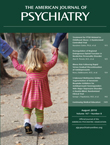Efficacy of Meta-Cognitive Therapy for Adult ADHD
Abstract
Objective
The authors investigated the efficacy of a 12-week manualized meta-cognitive therapy group intervention designed to enhance time management, organization, and planning in adults with attention deficit hyperactivity disorder (ADHD).
Method
Eighty-eight clinically referred adults who met DSM-IV criteria for ADHD according to clinical and structured diagnostic interviews and standardized questionnaires were stratified by ADHD medication use and otherwise randomly assigned to receive meta-cognitive therapy or supportive psychotherapy in a group modality. Meta-cognitive therapy uses cognitive-behavioral principles and methods to impart skills and strategies in time management, organization, and planning and to target depressogenic and anxiogenic cognitions that undermine effective self-management. The supportive therapy condition controlled for nonspecific aspects of treatment by providing support while avoiding discussion of cognitive-behavioral strategies. Therapeutic response was assessed by an independent (blind) evaluator via structured interview before and after treatment as well as by self-report and collateral informant behavioral ratings.
Results
General linear models comparing change from baseline between treatments revealed statistically significant effects for self-report, collateral report, and independent evaluator ratings of DSM-IV inattention symptoms. In dichotomous indices of therapeutic response, a significantly greater proportion of members of the meta-cognitive therapy group demonstrated improvement compared with members of the supportive therapy group. Logistic regression examining group differences in operationally defined response (controlling for baseline ADHD severity) revealed a robust effect of treatment group (odds ratio=5.41; 95% CI=1.77–16.55).
Conclusions
Meta-cognitive therapy yielded significantly greater improvements in dimensional and categorical estimates of severity of ADHD symptoms compared with supportive therapy. These findings support the efficacy of meta-cognitive therapy as a viable psychosocial intervention.



